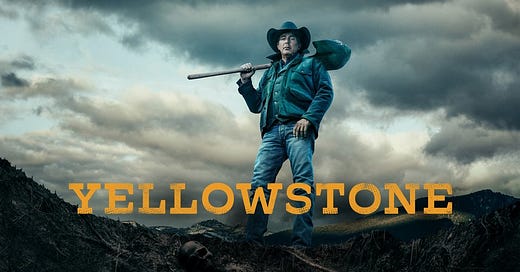The economics of the streaming war remain somewhat mysterious to me.
After all, Netflix generates some $30 billion in revenue and has more than 200 million subscribers worldwide, yet this is still considered a disappointment to some on Wall Street. As a result, the biggest streaming service in the world’s stock price has reverted to its pre-COVID level. At any other point in the history of filmmaking, Netflix would be seen for what it is: a massively powerful studio generating enormous amounts of revenue. But because it is not obviously going to be the only streamer standing at the end of this conflict, it’s still a disappointment.
Meanwhile, none of the also-rans aside from Disney+ and maybe HBO Max really seem to be mounting a proper counteroffensive. Consider Peacock, Comcast’s entrant into the streaming wars: they had just nine million subscribers by the end of 2021 (despite having streaming rights to the most popular show on TV, Yellowstone, and a bunch of sports offerings), generating just $778 million. Oh, and next year they’re probably going to lose another $2.5 billion or so.
No big deal, I guess. But this sort of thing just can’t be sustainable; no one wants to pay separate fees for Peacock and Paramount Plus and Hulu and Netflix and HBO Max and Disney Plus and Prime Video and Apple TV+ and Discovery+, to say nothing of niche channels like Criterion and Arrow and Shudder. If only there were some sort of way to … bundle all these channels together. And then pipe them straight to your TV with some sort of … cable.
Maybe one day we’ll have the technology; that day can’t come soon enough for some of these also-rans.
Links!
This week I reviewed A Hero, which won the Grand Prix at last year’s Cannes Film Festival. It’s on Prime Video now, so you can watch it this very instant if it happens to be one of the many streaming services to which you undoubtedly subscribe!
The story about China censoring Fight Club is kind of funny because it’s so on the nose, but it raises a real question: why aren’t the artists behind the film speaking out against this?
The novel’s author, Chuck Palahniuk did address the story, and had some pointed comments about America’s own censorship practices.
Speaking of government bodies doing dumb things with books in America: a schoolboard in Tennessee determined that Art Spiegelman’s Maus is inappropriate for schoolchildren to read and a schoolboard in Washington determined that To Kill a Mockingbird is inappropriate for schoolchildren to read. Dumb!
On Across the Movie Aisle this week, we asked why the Internet is being so mean to West Side Story’s Rachel Zegler and reviewed The Lost Daughter. And if you liked that little summary up top about the state of the streaming wars, sure to check out the members-only bonus episode about Netflix’s very bad couple of months.
On the Bulwark Goes to Hollywood this week, I talked to Janice Min about her and Richard Rushfield’s plan to pump up one of my favorite entertainment industry newsletters, The Ankler, as well as the past, present, and future of Hollywood trade publications.
Assigned Viewing: Heist (Netflix)
An under-appreciated gem from David Mamet starring Gene Hackman in one of his final turns before his retirement in 2003, Heist is a must-watch for anyone who likes Mamet’s signature masculine, muscular dialogue and intricate plotting. The flick has an absolute all-star cast—Hackman is joined by Delroy Lindo, Danny DeVito, Sam Rockwell, and Mamet-favorite Ricky Jay—and, like I said, it has that vintage hard-nosed Mamet dialogue. Watch it tonight!







"If only there were some sort of way to … bundle all these channels together. And then pipe them straight to your TV with some sort of … cable."
FOR REAL. I can't believe the streaming services model hasn't imploded already. It's unwieldy and expensive and annoying. I can see the point with sports, because we get better coverage of niche sports than we've ever had before. But with shows and movies, it just doesn't make sense.
Heist a good pick for Assigned Viewing. Talented cast using those talents well.